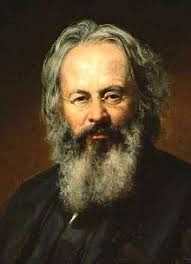“When the Son of Man comes, will there be faith on earth?” Luke 18:8
Orestes A. Brownson (1803 –1876) was among the most original and powerful intellects of his era. A self-taught child prodigy who had memorized most of the Bible by the age of 14, in youth he attached himself to the New England Transcendentalists and advocated a liberal and utopian socialism. Having outgrown his errors, at the age of 41 and after meeting with the bishop of Boston, he became a Catholic. Brownson went on to become the foremost American Catholic apologist of the 19th century. Saint John Henry Newman declared he had no equal. Among the targets he most often attacked were socialism and liberalism. He correctly predicted and supplied reasons for the imminent fragmentation and decline of Protestantism that would inevitably lead in time to the rise of atheism. Between 1873-74 Brownson published an essay in three parts refuting atheism. His thoughts are worth looking at, considering the explosion of atheist literature in our time.
Catholicism vs Atheism
Brownson understood full well that the great controversy of the future would not be between Catholicism and the hundreds of Christian sects that have sprung up since Luther, but rather between the Church and the domains of science and philosophy that had become infected by an angry and haughty skepticism. In other words, the great struggle of the future would be between God and No-god. The preparation for this great combat, Brownson asserts, began when modern science acquired its theories of nature without considering whether the universe has a first or final cause, or whether God conducts any business in the affairs of the world (miracles are most certainly excluded from consideration). Brownson also recognized that all the modern schools of moral philosophy had begun to examine questions of right and wrong without any reference to God and traditional religion. Moreover, Brownson saw the world of politics governed by political atheists who assured everyone “that the secular order is independent of the spiritual, and can and should exist and act without regard to it.”
Brownson objected strenuously to the assumption of educated and well bred contemporaries that atheism was a mere puff of smoke that would drift away in time. After all, scripture tells us atheists are fools (Psalms 14:1), and how many fools can there be? Brownson replied: “Facts, too, painfully certain to be disputed, and too numerous to be unheeded by any one who attends to all that is going on under his very eyes, prove the contrary. The fools are not dead, a new crop is born every year.” With insight that might well apply to our own time, Brownson observed: “There may be, and we trust there is, much faith, much true piety left in Christendom; but public opinion, we may say the official opinion – the opinion that finds expression in nearly all modern governments and legislation – is anti-christian, and between Christianity and atheism there is no middle ground, no legitimate halting place.”
Pantheism (the identification of God with the Universe) is a philosophy sometimes toyed with by atheists as a sort of middle ground between theism and atheism, Brownson declared. But an uncreated universe does not logically or convincingly substitute its infinity and eternity for an uncreated God. While pantheism denies the existence of a Creator who creates something from nothing, the atheist denial of a Creator stems first from the assumption that there is Someone to deny. Theism therefore precedes atheism in the order of our logical experience, and so is a more fundamental presumption than atheism ever could be. The heritage of Abraham precedes in historical records all human memory of the origins of either pantheism or atheism. Even ancient polytheisms had a tradition of acknowledging a deity supreme above all others. There are some ancient cultures that pit good gods against bad gods, but we do not find ancient cultures that pit God against Nogod. This was so until modern times. As Brownson notes: “Three centuries ago Christian theism was held universally by all ranks and conditions of civilized society, and atheism was regarded with horror, and hardly dared show its head.”
Theism vs Scientism
If the ancient instinct of humanity is for theism, it becomes the burden of the atheist to prove the fallacy of this instinct. This is decidedly an impossible task. For example, every effort to assert that science has made a supernatural God irrelevant ends in the impossibility of proving that God does not exist, because the methods and conclusions of science can only apply to natural things and events. This does not stop atheists from alleging that the methods of science are superior to the methods of theology, nor does it stop them from alleging that science in the long run will always seem more provable than theology. Therefore, scientism alleges, in the course of time theology will lose the hold it has on the collective mind and heart of humanity.
But, Brownson insists, all this is mere subjective conjecture, and by no means proof that God does not exist, so much as offering more proof that the atheist has no positively logical argument against God. When an atheist astronomer says he has never seen God through the end of his telescope, that is only because the theologian would certainly agree that God is invisible to the naked eye. To the atheist who says there is no God because God cannot even be imagined by human intelligence, Brownson replies: “There is a basis of reality in all our mental conceptions, even in our wildest imaginations and our most whimsical fancies, for we can neither think nor imagine what is absolutely unreal.” For example, while it is impossible to imagine a circular triangle, it is not impossible to imagine a being of whom no being greater can be conceived.
Proving God Exists
Brownson then examines all of the proofs for the existence of God. Following Aquinas, these proofs rely upon the idea of a First Cause, a Creator who not only designs and makes his creation, but orders it to a particular end. Some of these arguments Brownson clearly prefers to others. Like Kant, Brownson argues: “The moral law proceeds from God as a final cause of creation, as the physical laws proceed from God as first cause, and is the law of our perfection, necessary to be obeyed in order to fulfill our destiny, or to obtain our supreme good or beatitude. If there is no God, there is and can be no moral law, and then no morality. Till you know God is, and [is the] final cause of the universe, you cannot call any facts of the soul ethical.” But since moral laws do exist, there must be a God who is their source and authority, or else life is a meaningless clash of opposing wills and there is no final way to discern good from evil. Now perhaps this is less a proof of God, than a proof that without God nothing makes sense and moral certainty is impossible.
Brownson’s favorite argument for God seems to be the third proof of St. Thomas. He explains and analyzes that proof, which cannot be replicated here because of its length and complexity. A summary may suffice: Every thing has a cause. But all these things are only possible things, according to Aquinas. That is to say, they might come to exist and they might cease to exist. Now for all these possible things to come and go there must be something that causes them to come and go. This cause cannot itself be possible, since then it would never have come to be (there being no other cause to cause it). Rather, it must be a necessary cause, and it must exist outside time and the universe, or else it would be only possible like everything else in the universe. This cause, we may conclude, is not only necessary, but also eternally uncaused. This cause is not only necessary and eternal, but also not physical, or else again it would be only possible, as all other physical causes are only possible. Another way of saying not physical is … spiritual. This Necessary Cause, Aquinas concludes, we may call God.
Early Signs of Scientism
Next Brownson attacks the pernicious effect atheism has on society and the subtlety by which it has acquired its influence. “From the philosophers and false scientists atheism has descended to the people through popular literature, and diffused itself among the half-learned, chiefly by modern lectures and journalism, until literature, art, science, ethics, and especially politics, have become infected, and the very air we breathe saturated with it.” Brownson attributes the rise of atheism not to the ignorant, but to the learned of every society. It is they who, in the last two centuries, have forgotten the tradition of the Creation (originating in the first verses of Genesis) once honored by all the great scientists of Western Civilization, even by the greatest of them all, Isaac Newton. That traditional knowledge of the Creation only came to be because the Judeo-Christian religion had delivered it to Greece and Rome, which for centuries had been immersed in an absurd polytheism that was doomed to fail upon the arrival of Christianity.
According to Brownson, the advent of scientism has greatly inhibited the triumph of Christianity. In an article titled Darwin’s The Descent of Man Brownson spoke of the likes of Darwin, Spencer, Huxley and others as men … who publish opinions, theories, hypotheses, which are at best only plausible conjectures under the imposing name of science, and which unsettle men’s minds, bewilder the half-learned, mislead the ignorant, undermine the very bases of society, and assail the whole moral order of the universe, are fearfully guilty, and a thousand times more dangerous to society, and greater criminals even than your most noted thieves, robbers, burglars, swindlers, murderers, or midnight assassins. Instead of being held in honor, feted, and lauded as the great men of their age and country, and held up as the benefactors of their race, they richly deserve that public opinion should brand them with infamy as the enemies of God and man, of religion and society, of truth and justice, of science and civilization. They are such men as, if we follow the injunction of St. John, the apostle of love, we should refuse to receive into our houses, or even to bid good-day: Si quis venit ad vos, et hanc doctrinam nor affert, nolite recipere eum in domum, nec ave dixeritis.- 2 John, 1:10.
Lawless Relativism
Moreover, that great tradition of the Creation assumed an authority belonging to the Creator, who lays down commands as to how we should do good and avoid evil. This presents a dilemma for the atheist, for if there is no divine Lawgiver, we cannot know for a certainty very much about good and evil, nor can we be bound by our uncertainty, individually or collectively, to obey laws of which we are uncertain. If Brownson were alive today, he would see how fully his analysis had been vindicated in the modern jungles of morality. As Brownson explains it: “There is then no morality without religion, and no religion without morality. He who refuses to keep the commandments of God and to render him his due, violates the moral law no less than he does the religious law. Let us hear no more then of independent morality, which is only an invention to save the absolute surrender of our wills to the will of God, and is inspired by a reluctance to acknowledge a master.”
Over time the Gospel spread through the nations of the Roman empire and delivered them from pantheism – which is the belief not that the world was created, but that the world itself is eternally divine. Pantheism is what made it respectable in the ancient world to worship the forces of Nature (the gods of the sky, the sea, the wind, and the earth). It was only in recent centuries that intellectual corruption has set in yet again with the rise of scientism. The Biblical story of Creation, once so widely revered by the greatest of intellects, has morphed ever so gradually into the Darwinian story of Evolution, which has resulted in the rejection not only of Creation, but of the Creator.
In this Brownson is greatly vindicated by the rise of radical atheism in the last hundred years. No less a scientific modernist than the biologist Richard Dawkins in our time has insisted that the theory of evolution makes atheism a respectable belief. But it is the central point of evolution that there is no intelligent design behind the universe, no final purpose for our being. All reality is given to blind chance and random mutations. Or as Brownson put it: “Indeed, the first step in the downward progress toward atheism, is the denial or non-recognition of the teleological order.” What Brownson could not know in his day was that in half a century evidence for the Big Bang theory about the creation of the universe would present an unsolvable enigma to those who thought that Darwin’s theory had dispelled the idea of Creation. Nor could Brownson have known that in the next hundred years the discovered complexity of the single living cell would generate wonderment among eminent scientists about how life could have first been formed without being designed, as Aquinas argued in his fifth proof from design.
For Brownson, God is both the First Cause and the Final Cause, the Alpha and the Omega of Creation. All is directed by God to his own end, which is that we may know him for our perfection, which is his gift to us if we freely accept it. There are those who will not accept it. They are eternally lost to God. Citing St. Augustine, Brownson concludes: “St. Augustine teaches that existence itself, since it participates of being, is a good, and consequently even the eternally lost are gainers by their existence, though by their own fault they have made it a source of everlasting pain. To be is always better than not to be.” Clearly for Augustine, Hell is better than the Void. Those who choose suicide fail to see the distinction, for they believe that the void called death is preferable to the hell this life has become for them. In truth, the suicide, by abandoning hope, has merely exchanged one hell for another.
Concluding Thoughts
Brownson offers a thoughtful summation that, if not a proof for God, is likely to be nurturing grist for the atheist to digest.
It is certain that the soul finds its complete satisfaction in no natural or created good. It craves an unbounded good, and will be satisfied with nothing finite. Why? Because it has an ever-present intuition that it was made for an infinite good. Why? Because God the infinite everywhere and at every instant presents or affirms himself to the soul as that alone which can fill it, or constitute its beatitude. The fact that every limited or created good is insufficient to satisfy the soul has been noted and dwelt on by philosophers, sages, prophets, and preachers in all ages of the world, and it is the theme of the poet’s wail, and the source of nearly all life’s tragedies. Yet it is inexplicable on any possible hypothesis except that of supposing the soul was made for God, and has an intuitive intimation of the secret of its destiny.
The atheist H.L. Mencken once described faith as an illogical belief in the improbable. Why is it not just as logical that the undoubted faith in atheism is improbable? For if it is probable that God does not exist, why is it not more improbable that Nogod does? Unbelief is no answer to the great mystery of life; rather, chronic doubt unleashes a plethora of dreads and follies, without even the prospect of hope … the always consoling prize at the bottom of Pandora’s Box. Finally, the atheist philosopher Friedrich Nietzsche divulged his total loss of sanity when he announced before his confinement to an asylum: “Hope is the worst of evils, for it prolongs the torment of men.”
It is certain that philosophy cannot be a substitute for the mysteries of religion. The reasoning head, only by perversely straining logic, can trump the reasoning heart. Though God’s revelation granted us in Scripture is not the foundation of the philosophical method, Brownson concludes, no philosophy that truly claims to love wisdom can be constructed in defiance of God’s revealed Word, surely a higher authority than man’s predictably presumptuous and fallible brain.










